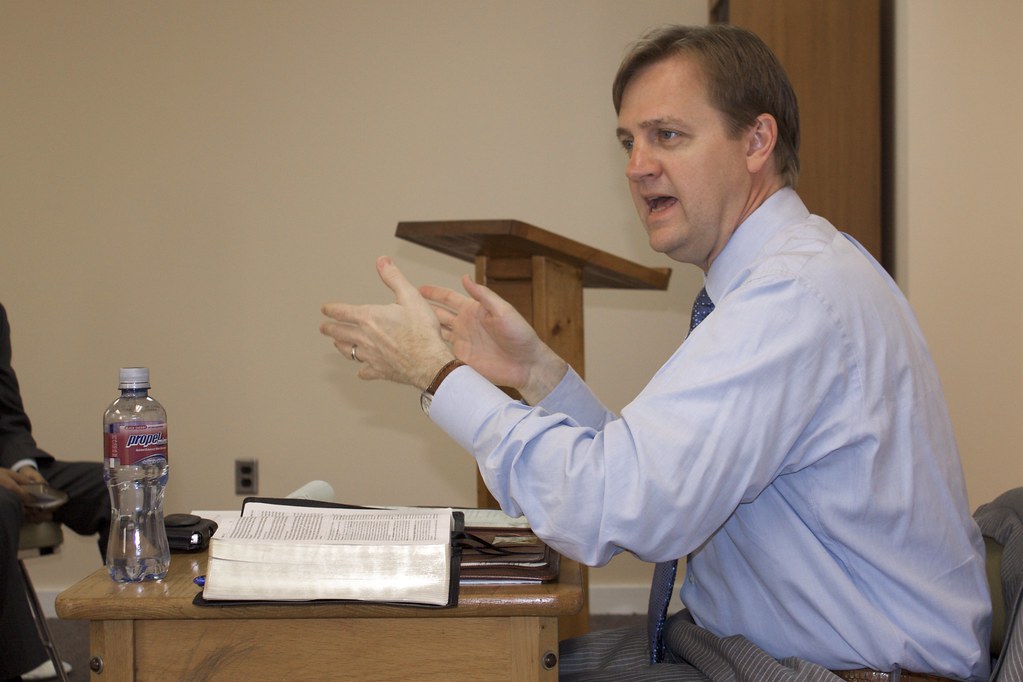
One of the scariest things I have learned as an adult.
Just because you’re 18, 48 or 108, doesn’t mean you know much more about church doctrine than someone who is 10, 12 or 15.
Your hormones calm down with age allowing you to think more clearly, but that’s about it for most people.
This became very apparent in one Elder’s Quorum meeting when we had a class about trials.
A man raised his hand and offered a suggestion.
He said that we should be happy when we’re give trials. That all trials come from God and we should seek more of them.
This Brother talked about how he taught his children that they should pray for more trials in life.
He even recounted an experience when he sat his boys down one day and all of them prayed that a trial would occur to strengthen them.
That weekend, their neighbor’s basement flooded and this man and his boys were able to help the neighbor by moving things out of the basement. After the service this man and his kids prayed to God thanking him for answering their prayer by flooding their neighbor’s basement.
I was shocked.
I couldn’t believe that he taught your kids to pray for bad things to happen?
Why not pray for infidelity in your family. Or cancer. If you think it’s good for bad things to happen “go big or go home.”
The fact that this man was so upfront about praying for bad things to happen to himself and other people seemed to amaze me.
Naturally I raised my hand and asked him why he thought he needed to do that.
He said it’s church doctrine that we should seek out trials. He said that the Prophets and the apostles have spoke on it multiple times and that if one reads the Book of Job it’s clear how good trials are.
Clearly this wasn’t actual church doctrine. But I couldn’t help but wonder if he often prayed for bad things to happen to others so he could serve them? How far was he willing to go with this idea? Will his kids take issue with the church when they’re older because they think the church promotes this idea? Will nonmembers be turned off to the church because he may mention this in a conversation at some point?
Now most of the time when opinion is taught as doctrine it isn’t that crazy. Most of the time it’s people arguing about why we’re not allowed to drink caffeine, why black people couldn’t have the priesthood, or whether or whether Adam had a bellybutton. Most of the time this stuff isn’t of any real eternal importance. But it can be.
It can be a problem when people try to tell cancer patients that if you have faith you’ll be healed. It can hurt when we tell LGBT members that they just need to pray the gay away. It can be an issue when you teach your children to ask God to make bad things happen to others so you can let you “light” shine through service.
I hope I’m not “that” guy who teaches his opinions as doctrine. But I’m sure I am at times. In fact, I think we are all “that” guy sometimes. There are enough verses and quotes from various general authorities that can be interpreted to mean anything out context to paint any picture we want.
Below is my attempt to outline some personal rules that I think we should all adopt to stem this problem. We can’t do much to control what other people say but we can control what comes out of our own mouths.
Cite Your Source or Own the Source
I couldn’t even begin to count how many time’s I have heard different commentators at church say things such as, “I can’t remember who said it but I think it was one of the members of the Seventy who said…” or “I can’t remember the exact quote but I think it said…” or “I can’t remember where it is the scriptures but you know when it’s talking about…”
This needs to stop.
If you don’t know who the quote is from, don’t use it. If you don’t know what was exactly said, don’t say it. Instead own the opinion as your own.
Don’t quote “some member of the Seventy” you think said that caffeine is bad. Just say “I think caffeine is bad for X reason.”
It’s okay for members to have different opinions on issues.
What’s not okay is passing your opinions off by paraphrasing someone you swear agreed with you on the topic that is in a place of authority. This is not to say that most people have bad intentions.
I think most members honestly think that General Authority X did once say something about how Facsimile 2 was a map to Kolob. The problem is that most of the time it’s something they half-heard another member say while playing Angry Birds in Sunday School.
If you don’t feel like owning your own opinion then it is probably best not to mention it.
Add Opening and Closing Quotes
Many times we’ll start quoting from the scriptures and we’ll add our own side comments to the quote. The problem with this is that it confuses people. When does the quote start and the commentary end?
The easiest way is to open and close quotes with verbal quotes. The General Authorities do it so why don’t we?
Along with verbal quotes we should always explain that it’s our interpretation of their words.
When we use quotes it should be like this:
“I think G.A. X’s words would be great for this discussion. He said quote ‘blah blah blah blah blah,’ close quote. I think this means that “blah blah blah.”
Don’t Give Excuses For God
In relation to the Priesthood ban, Elder Oaks once said said, “If you read the scriptures with this question in mind, ‘Why did the Lord command this or why did he command that,’ you find that in less than one in a hundred commands was any reason given. It’s not the pattern of the Lord to give reasons. We can put reasons to commandments. When we do, we’re on our own. Some people put reasons to [the ban] and they turned out to be spectacularly wrong.
There is a lesson in that…. The lesson I’ve drawn from that, I decided a long time ago that I had faith in the command and I had no faith in the reasons that had been suggested for it.”
Even the General Authorities recognize time and time again the God rarely justifies himself. If God doesn’t feel as if he needs to, who are we to justify his actions? Sometimes it’s best to pray, ask God if the principle we’re talking about is true and go off the inspiration we receive.
Sometimes we have reasons why we personally follow the commandments. Some people feel like the Word of Wisdom is strictly for health related reasons. Others feel like it’s just a matter of obedience. Any reason that inspires one to follow God’s commandments is a good reason. But that doesn’t mean that any one reason is “the” reason why God said what he said. Share your reason for following the commandments. Share your reasons for believing in the church’s teachings. But don’t act as if you’re an authority on God’s logic.
Speak Up
Sometimes you just have to speak up and help out. Ask people where they heard that quote or where in the scriptures it says expresses their same sentiment. You don’t need to be angry and you don’t need to attack people but it’s good to get out in the open that someone may be speaking their opinion and not necessarily doctrine. It’s good for everyone involved. Just be polite.
Educate Yourself
The fact is the BEST way to keep from confusing doctrine and opinion is to learn about the church. In recent years the church, as well as many other organizations have created amazing resources to better understand church doctrine and church history. It is our responsibility to learn as much about the Gospel as possible.
Elder Marion D Hanks said “No one knows anything about Christ’s work simply by being born a member of the Church, and often he knows little about it after years of unmotivated exposure in meetings or classes. He must learn. And learning involves self-investment and effort. The gospel should be studied ‘as carefully as any science.’ The ‘literature of the Church’ must be ‘acquired and read.’ Our learning should be increased in our spare time ‘day by day.’ Then as we put the gospel truth to work in daily life, we will never find it wanting. We will be literate in the most important field of knowledge in the universe, knowledge for lack of which men and nations perish, in the light of which men and nations may be saved.”
With the internet, there is only one good excuse for ignorance in church matters. And that is that God has remained silent on the issue. Below are a bunch of sources I have found to be useful in learning about church history and doctrine.
Church Related Resources
Joseph Smith PapersGospel TopicsMormonsAndGays.orgThe Genesis GroupMaxwell InstituteFAIR MormonThe InterpreterTeaching, No Greater Call
Featured Image by Darla Blase


I read both your blogs posted to The Cultural Hall… fantastic food for thought!
Thanks for speaking up. It surely makes me begin to believe there are more rational, open minded members out there.
I appreciate you challenging (by way of your expressions) people to THINK!
I love it. Thanks for writing this.